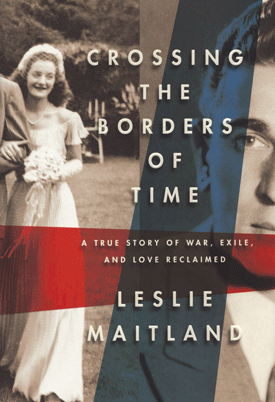Crossing the Borders of Time: A True Story of War, Exile, and Love Reclaimed, by Leslie Maitland, Other Press, 512 pages, $27.95.
Reviewed by NEAL GENDLER
Had Leslie Maitland set out to write a gripping romance novel, she hardly could have exceeded this fascinating account of her mother’s life.
Crossing the Borders of Time is more beautiful than a novel because of the power of its true story and the richness with which it is told. Maitland, a former New York Times reporter, writes with a reporter’s ear for clarity, eye for detail and care for quotation.
The story is of a woman who, like many people, never ceases to feel affection for her first love. Janine Maitland — once Hanna Günzburger, of Freiburg, Germany — is 18 when war tears her from French Catholic Roland Arcieri, 20. A series of betrayals thwarts attempts at a postwar reunion; yet even through decades of marriage and comfortable American life, she “had never ceased to yearn for him,” Maitland says.
The subtitle reveals a reunion with “the man I’ve wanted all my life,” but until readers get there, we learn of decades of twists, turns and surprises too rich for a reviewer to disclose.

This is page-turning stuff that seizes attention with a cinematic beginning: The author knocks on the door of Roland’s sister. The door isn’t opened until page 426, after we get a long but attention-ensnaring account of Janine’s life so intimate that you wonder how even a daughter could know so much. The explanation is in the book and in an author’s note.
That note reveals Roland Arcieri as a name invented to protect his privacy — oddly, because photos of him as both young and old, surely identifiable, are among the many adding much information and appeal to this attractive work.
Janine’s family’s happiness unravels with Freiburg’s increasing Nazification. Her industrialist father is forced to sell his business for a pittance, and in August 1938, they flee to France. Impoverished and sustained by loans from relatives, they are forced to move several times, father Sigmar is arrested and imprisoned for a time, and Janine — a name Hanna chose in rejection of all things German — meets Roland. Soon, they’re swirling in young love’s all-engulfing aura.
But as the Vichy regime collaborates in persecution, the family must flee France, fortunately gaining visas for Cuba. Leaving Marseilles aboard a bunk-crammed transport March 13, 1942, Janine watches Roland following as far as he can in a rowboat, in her pocket a 12-page letter pledging postwar marriage. Amid a ship of Jews thankful to escape, she is heartbroken at the worst experience of her life.
The voyage takes weeks, ending with months of internment in a rundown Cuban transit camp. Eventually free to live in Havana, the family awaits admission to the United States, which comes in July 1943.
Crossing is elevated far above a simple biography by Maitland’s extensive research, teaching us about where and how the family lived, the effect of the rise of Nazism, the chaos of France’s collapse and the terrible times as Jews disappear.
Alas, like so many others these days, this book lacks an index. Disturbingly, a book jacket photo has been altered, which for a news photographer would be an ethical lapse leading to punishment. It shows Janine on husband Leonard’s arm (all we see of him) as they walk from their marriage ceremony. She is looking to the right, toward a photo of half of Roland’s face — which practically shouts her continued longing for him. Inside, the entire photo shows Janine on Leonard’s left, looking the other way. The designer claims liberty to reverse the photo because “the cover is intended as editorial commentary on the subject matter, not journalism.”
Okay, but I think that’s too fine a distinction; readers expect photos to be accurate. The designer credit then should have said “photo illustration.”
Crossing is long, but so well written it seems like a good novel — and is equally hard to put down.
***
Neal Gendler is a Minneapolis writer and editor.
(American Jewish World, 4.27.12)




















I too was puzzled by the use of the pseudonym Roland Arcieri. I’ve searched for an explanation but have found only your statement. If his wife is still alive, perhaps she deserves to be protected, but the photos definitely provide his identity. As you say, odd. Any further info, insights?